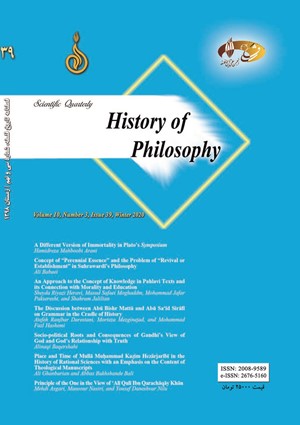Explaining Fārābī’s Teleological View of Music
Subject Areas : Connection of philosophers’ views and philosophical schools with the social and philosophical conditions of the timeMohsen Habibi 1 * , Seyed Mohsen Mousavi 2
1 - Assistant Professor, Philosophy Department, Allameh Tabataba’i University, Tehran, Iran
2 - MA student of University of Religions and Denominations, Qom, Iran
Keywords: Fārābī music ultimate cause poetry kitab al-Musiqa al-kabir (The Great Book of Music) happiness ,
Abstract :
Fārābī’s specific view of music reveals the teleological importance of music for him. In his philosophy, music is connected with logical thought and political philosophy, and this connection plays an effective role in his musical system. The relationship between music, logic, and politics is established through the end of music. That is, the genre of poetry, as a part of logic, determines the end of music and also develops a relationship with civil philosophy (politics) in the course of this relation in the view of Fārābī. The reflection of such relationships can be seen in the definition of music, specifying its principles and source of its formation, types of music, and the classification and ranking of musical instruments. Given the final cause of music and its principles, which mathematics is not capable of explaining, Fārābī distances himself from mathematics when analyzing music. He equates the final cause of music with that of poetry, which is the same provoking of imagination to attain happiness for all. In this way, he emphasizes the imitative aspect of music and defines it as something more than a tool for entertainment. The teleological view yields some consequences for Fārābī’s general approach to music, which are the focal points of this paper.
ابنسینا (۱۴۰۵) جوامع علم موسیقی شفاء؛ تصحيح یوسف ذكريا، قم: كتابخانه آيتالله مرعشی نجفی.
ارسطو (۱۳۹۷) اخلاق نیکوماخوس، ترجمة محمدحسن لطفی، تهران: طرح نو.
ارسطو (۱۳۶۹) دربارة نفس، ترجمة علیمراد داوودی، تهران: حکمت.
ارسطو (۱۳۴۹) سیاست، ترجمة حمید عنایت، تهران: کتب جیبی.
ارسطو (۱۳۹۳) فن شعر؛ ترجمة عبدالحسین زرینکوب، تهران: امیرکبیر.
افلاطون (۱۳۸۴) دوره آثار افلاطون، ترجمة محمدحسن لطفی، تهران: خوارزمی.
افلاطون (۱۳۸۸) جمهور، ترجمة فؤاد روحانی، تهران: علمی و فرهنگی.
انوار، سید عبدالله (۱۳۷۸) «مبانی موسیقایی فارابی»، کتاب ماه فلسفه، شماره۱۷.
برکشلی، مهدی (۱۳۸۹) اندیشههای علمی فارابی دربارة موسیقی (مجموعه سخنرانیها)، تهران: فرهنگستان هنر.
خوانساری، محمد (۱۳۹۱) دوره مختصر منطق صوری، تهران: دانشگاه تهران.
خورابه، کاوه (۱۳۹۶) «مبانی نظری موسیقی در جهان اسلام»، هنر در تمدن اسلامی، زیر نظر هادی ربیعی، تهران: سمت.
داوری اردکانی، رضا (۱۳۵۴) فلسفه مدنی فارابی، تهران: زر.
فارابی (۱۳۸۹) احصاء العلوم، ترجمة حسین خدیوجم، تهران: علمی و فرهنگی.
فارابی (۱۴۱۳) الاعمال الفلسفیة، تصحيح جعفر آل ياسین، بیروت: دارالمناهل.
فارابی (۱۹۸۷) التنبیه علی سبیل السعادة، تصحيح سبحان خلیفات، عمان: الجامعة الاردنیة.
فارابی (۱۳۹۶) السیاسة المدنیة، ترجمه و شرح حسن ملکشاهی، تهران: سروش.
فارابی (۱۹۸۷م) المنطق عند الفارابی، تصحيح ماجد فخری، بیروت: دارالمنطق.
فارابی (۱۳۹۰)، المنطقیات الفارابی، تصحيح محمدتقی دانشپژوه، قم: کتابخانه آیتالله مرعشی نجفی.
فارابی (۱۹۷۶م) الموسیقی الکبیر، تصحيح غطاس عبدالملک خشبه، القاهره: دارالکاتب العربی للطباعة و النشر.
فارابی (۱۳۶۱) اندیشههای اهل مدینه فاضله، ترجمة سیدجعفر شهیدی، تهران: طهوری.
فارابی (۱۳۸۸) فصول منتزعه،ترجمه و شرح حسن ملکشاهی، تهران: سروش.
فارابی (۱۳۹۱) موسیقی کبیر، ترجمة آذرتاش آذرنوش، تهران: پژوهشگاه علوم اسلامی و مطالعات فرهنگی.
فخری، ماجد (۱۳۹۱) سیر فلسفه در جهان اسلام، ترجمة هیئت مترجمان، تهران: مرکز نشر دانشگاهی.
مراغی، عبدالقادر بن غیبی حافظ (۱۳۸۷) جامع الالحان، تهران: فرهنگستان هنر.
معارف، سیدعباس (۱۳۸۳) شرح ادوار صفیالدین ارموی، تهران: سورة مهر.
هالیول، استیون (۱۳۸۸) پژوهشی دربارة فن شعر ارسطو، ترجمة مهدی نصرالهزاده، تهران: مینوی خرد.
Madian, Azza Abd al-Hamid. (1992). Language-Music Relation in al-Farabi's GRAND BOOK OF MUSIC. Cornell University.

